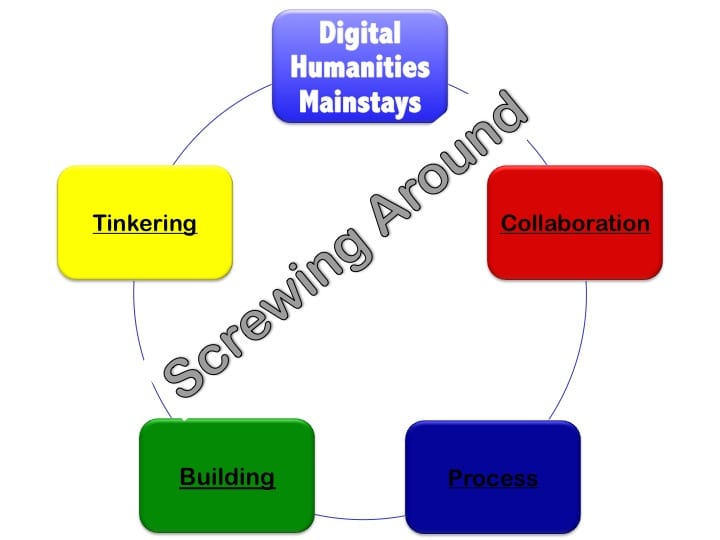Thanks to Jennifer Redd, eCampus hosted a Digital Pedagogy Workshop on April 9 for ~25 engaged faculty from a variety of departments and disciplines all over San Jose State University. Because the attendees were guaranteed to hail from a variety ofDigital Pedagogy expertise levels, I ran the workshop with multiple points of intervention and input captured with Session Notes in Google Docs. The primary purpose of the workshop focused on theorizing Digital Pedagogy instead of teaching to the tools. We eventually get around to that, but first we spent a lot of time theorizing about the uses of Digital Pedagogy.
Much of the definitions on these slides come from the in-progress draft Introduction for Digital Pedagogy in the Humanities (currently openly available in GitHub in its post-peer review and pre-user-friendly digital platform phase). The project is scheduled to be finalized with a brand new digital platform that will allow for users to save pedagogical artifacts and keywords to a private account along with being able to search and utilize tags (e.g., beginner, intermediate, advanced levels of Digital Pedagogy; assignments; syllabi, etc.). The final platform, being built by our publisher, the Modern Language Association, is due to be finalized along with the entire project and the editors’ introduction during Summer 2019. With 4 editors, 84 curators, ~700 artifact creators, the project provides a wide array of pedagogical materials for use in many disciplines, even those outside of the Humanities.
Digital Pedagogy Workshop from eCampus on Vimeo.
The slides are available on Google Presention.
The Lunch n’Learn gatherings are a terrific way to 1) meet faculty from across campus; and 2) enjoy a delicious lunch provided by eCampus. For other videos of lectures and engaging articles, check out the eCampus Resources page.
Now that we’ve met, what would you like to read about in the remaining 2 blog posts on Digital Pedagogy this semester? Leave a comment or email me directly: katherine[dot]harris[at]sjsu[dot]edu
For those interested in more about Digital Pedagogy throughout the California State University system, consider attending the Student Success Conference being held at SJSU April 15, 2019 (registration required), especially these panels:
Session S1C: Using Technology to Improve Student Success Poster Session
Location: Room 3B – Jennifer Redd, Moderator – Presentations
- Comparing three strategies for providing feedback on a research assignment, Amy D’Andrade
- Exploring the impact of optional Canvas modules in course design, Michael Vallerga
- Integrating Canvas in student teaching: A strategy for coherence and support, Dean Sexton
- Digital Storytelling in Asian American History, Apryl Berney and Soma de Bourbon
Session S3C: Flipping as a Pedagogy in STEM Classes
Location: Room 3B – Poster Session – Ravisha Mathur, Moderator – Presentations:
- How flipped learning meets the diverse learning need in a first programming class, ChrisTseng
- Flipping a General Physics class using Mastering Physics, Ranko Heindl
- Defining Student Performance Expectations for Engineering Mechanics of Materials, Kurt McMullin
- Observations from a Flipped Section of CE 95 – Statics, Steven Vukavich
- On the Road to Flipping, Raji Lukkor
Session S4C: eCampus Student Success Programs
Poster Session – Location: Room 3B – Jennifer Redd, Moderator – Presentations
- Exploring the impact of a flipped course redesign, Krissy Connell
- Incorporating a point-of-care instrument into existing laboratory exercises to expand and diversify exposure to laboratory tools, John Geing
- Investigating interventions to determine if stress levels among students can be reduced, Pamela Wells
- Beyond SOTEs: Exploring formative and summative assessment in a GE college classroom, Mei-Yan Lu
- Evaluating undergraduate nursing students confidence and anxiety speaking with patients. Sheri Rickman Patrick
- Including robots in class to increase student-instructor interaction and provide hands-on experiences, Wencen Wu
- Student engagement: A key to success in the classroom, Linda Mitchell and Amber Sylva
- Providing hands-on field/laboratory experiences using drones, Kimberly Blisniuk, Emmanuel Gabet, and Hollianne McClure
Session S5B: Innovations in Teaching
Poster Presentations – Location: Room 3A – Mark Van Selst, Moderator – Presentations
- Epidemiology in Action: Applied Research in the Classroom, Miranda Worthen
- Leveraging Technology and Design Thinking in Social Entrepreneurship: Course Re-design Project in BUS4 188, Yu Chen
- How can Business Simulation Games Enhance Student Learning in Revenue Management? Yinghua Huang
- Promising Results from massive FYE course model and Intrusive Student Success Interventions, Michael Randle
5:00 pm Flipped Workshop
Location: Room 4A – This is a ticketed event and is limited to 200 attendees
